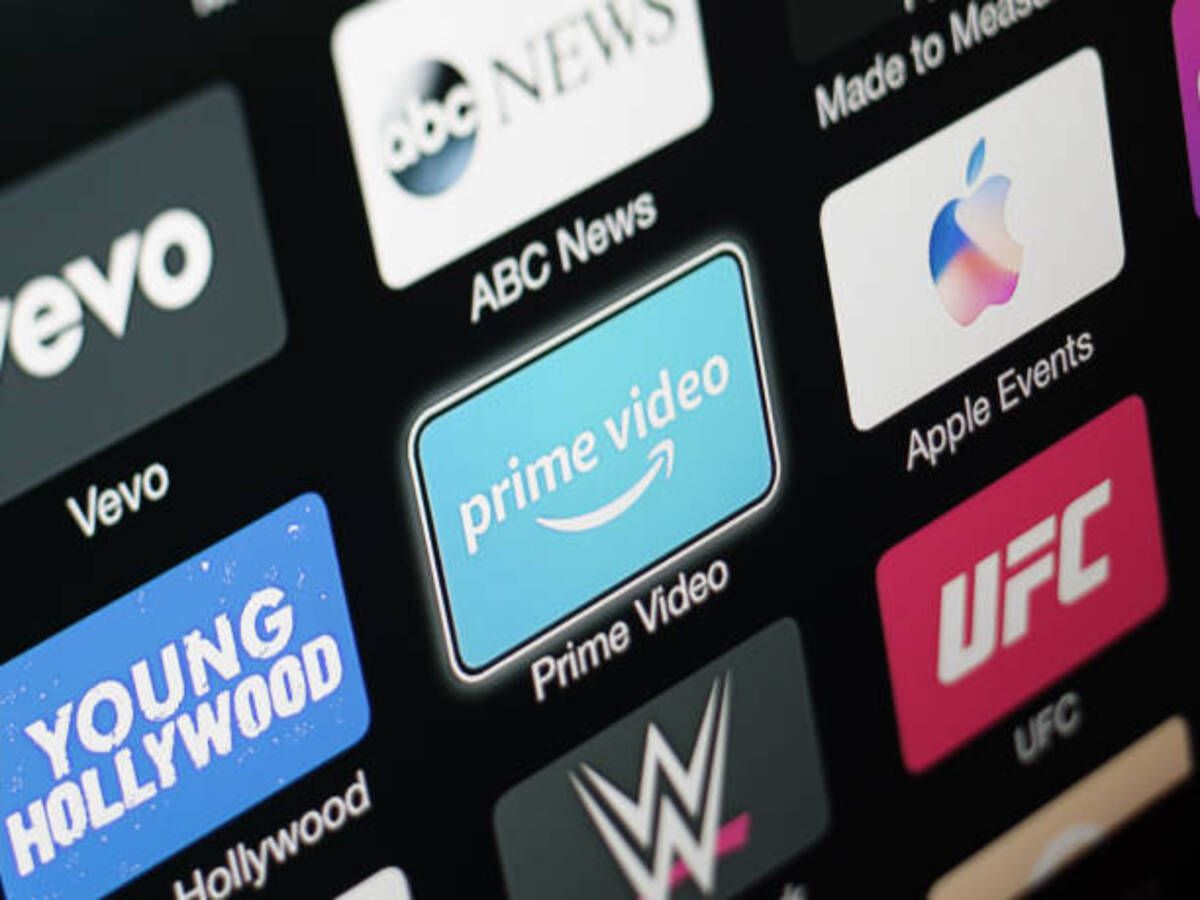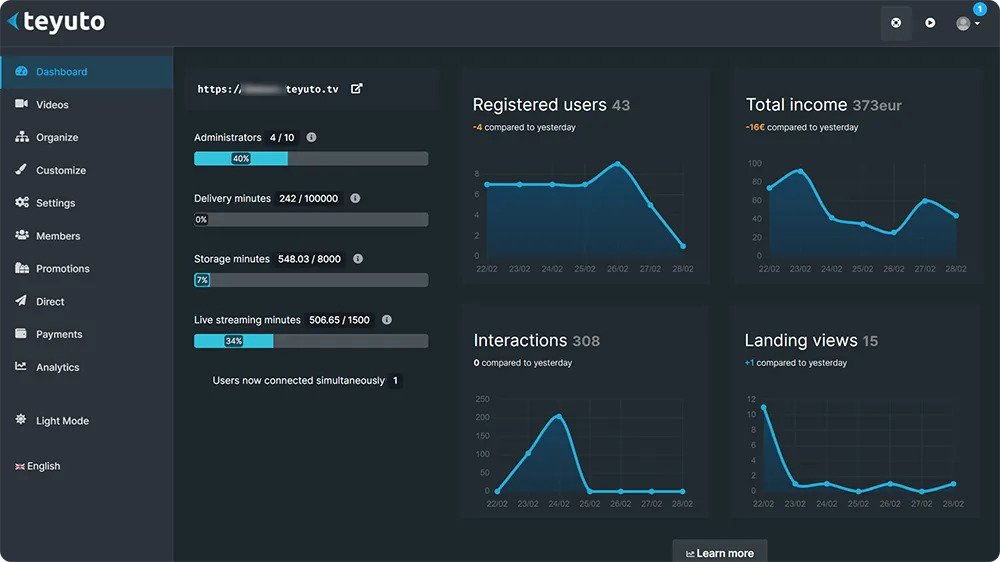

By 2023, the total number of OTT streaming app users will exceed 3.5 billion. As technology advances and more content becomes available, several users are getting swift access to OTT streaming services like Netflix, Hulu, and Amazon Prime Video.
They offer a wide variety of content and have become tremendously successful, and others are sure to follow suit. The streaming industry has grown with the development of Internet technology. The pandemic has further accelerated its growth worldwide.
OTT Market Share by Different Platforms
- Netflix 16 %
- Disney+ 14 %
- Amazon Prime Video 13 %
- YouTube 10 %
- HBO Max 8 %
- Hulu 6 %
Source: Statista.
Like VCRs and DVDs when they were introduced, broadcasting captured views worldwide. Previously, people only used streaming services as an alternative to cable services.
Why invest in OTT cloud video channels?
Over time, streaming services have evolved from mere tools into a part of our lifestyle. Smartphones have made streaming portable and ubiquitous, increasing consumption.

As the industry grew, it became more crowded and competitive. Launched in 1997 by Reed Hastings, Netflix has become synonymous with streaming.
However, success always attracts followers. Other companies followed suit when Netflix demonstrated the feasibility of a streaming strategy in the marketplace. Netflix is now up against a slew of competitors, including YouTube, Hulu, Disney+, Amazon Prime, and a few new entrants.
This article explains how aspirants can try to enter the saturated streaming market. And how they can use technology to stay ahead of the curve.
Stream Wars
Streaming industry giants like Netflix and Prime are investing heavily to cement their position as the industry leader. Stranger Things and The Patriot are examples of their desire to take over the market with original content.
Beginners with deep pockets can compete with the giants when it comes to content.
While it's true that content is the key to a streaming service's success, a great content library that's difficult to access is a failure. After all, people turn to streaming platforms for entertainment, and bad UX puts them off.
Do you know that?
What is a great user experience?
A good user experience is subjective and depends on the user. There is no one size fits. Luckily, several factors go into creating an excellent experience for every user.

- Content Recommendations
- UI-UX
- Frictionless streaming
Content Recommendation
It's no secret that the recommendation system relies solely on customer behavior data. To understand the user's tastes and preferences, we must classify and analyze the data in two aspects. The two elements must be mixed and introduced into the recommender system to make correct recommendations.
Movie Metadata
The more detailed the metadata is, the easier it is to attract suitable viewers.
A video without metadata is like a person at an airport without a boarding pass or money - they're not going anywhere.
Metadata not only helps you rank your videos in search engines but also allows you to inform your viewers about the details of the content they are watching. This is a great way to gain their trust.
Plus, it helps them find the content they might otherwise miss.
Take, for example, an x-ray of an Amazon Prime video. While browsing, click on the button to learn about the people who worked on it, and the best part is that you can discover other works by the artist.
User Profile
The user profile asks users for their region, preferred languages, genres they like, etc. This can be a great starting point for recommendations - when you need more data to analyze their interests.
You can only make recommendations based on their interaction with the video,
For example, if a user opens a drama but skips it after a minute or two; this may mean that the user is not interested in specific content. Opening a video does not guarantee that they will like it. Understanding their interaction is key. A powerful analytics engine is the best source for your recommendations.
Create Buzz: Show Recommendations

Besides recommending based on user preferences, recommending stellar content that everyone will love is a great way to create buzz around a show. If the content is entertaining and sold directly on social platforms, it will become a trend. And thus get more audience.
UX Matters!
Thanks to their deep pockets, Netflix and other big players like Prime and YouTube have set the bar high regarding content and user experience. While competing with them on content costs some serious money, working on an equally good, if not better, user experience is possible.
For OTT platforms, a good UI/UX should be simple, attractive, easy to use and make the client feel at ease.
That's the secret to Netflix's success - it just showcases what you're looking for.
A good UI/UX is about attractively displaying content and creating an easy flow – entering and exiting videos, making it easy to find, and creating an enjoyable experience.
Tips for Improving User-Experience
Organize: Organize your content. Organize your content like shows, seasons, movies, and other categories to make it easy to find content.

Simplicity: The interface should be simple and user-friendly. In addition to showcasing content with carousels and lists, it's essential to allow users to create custom watchlists where they can follow their favorite shows and resume watching previously watched videos.
Chat: Send notifications and emails. Push notifications are the best way to invite your audience to watch your content. The more creative and enticing your push notification is, the more likely it is to be opened.
Personalization is no longer a differentiator that acquires an audience. It has become a de facto requirement for retaining an acquired audience.
Uninterrupted Streaming
Imagine you are watching your favorite show, and suddenly your video stops, and you see a spinning circle on the screen. Nothing could be more annoying than this moment.
Now, this spinning wheel makes viewers leave almost immediately. Research shows that the higher the overall buffering in a session, the shorter that session will be.
One of the most commonly used methods to reduce buffering problems is encoding.
Encoding is the compression and transformation of video content into a form compatible with various devices and Internet speeds.
It must be compressed for viewers to view the video without any buffering issues. But compression can reduce quality. Would you sacrifice video quality to reduce friction? Well... that's not a good idea.
So what's the solution? This is Adaptive Bitrate Streaming.
For simplicity, think of your viewer's internet connection as a channel. The faster the connection, the wider the pipe - the slower, the narrower.
Now you need to stream the video file to your viewers over the channel. The video slides down the wide tube but gets blocked a few times in the path in the narrower tube. Therefore, it is not recommended to send uncompressed files through narrow channels.
This video compression method based on the receiving device's capabilities is called adaptive bitrate streaming. You should change the video quality settings or witness automatic quality changes on YouTube at least once. YouTube did this to slow down its churn rate. This is one of the fundamental lessons that can be learned from YouTube.
Among other benefits, adaptive bitrate streaming is an important reason to encode all your videos before distribution.
Create Amazing Content For Audience Engagement
No matter how unique your content is, your viewers will only leave if it becomes easier to access. To reduce friction, you need to understand your users and distribute your content to them exactly how they want it.

So the only secret is to understand your audience. Create fantastic content and distribute it where and when your audience likes it. This is the foundation of a good user experience.
Creating your own OTT channel is a simple task. You only need video content and a provider to host and stream it.
Target Your Audience
Whether you're a filmmaker, musician, or any other service provider with something to share, you can create video content that has value for your target audience.
You can even rent video content like movies and shows if you're not a content creator and want to set up a channel.
Find a Reliable OTT Hosting Solution: Teyuto
It's time to find a hosting solution. Cloud video platforms like Teyuto OTT provide various services, including hosting, content management, analytics, and monetization tools.
How to start a streaming service with Teyuto?
Teyuto is a platform that allows you to create and launch your own streaming service. Here are the steps to start streaming service like Netflix with Teyuto:
- Sign up for a Teyuto account: Go to the Teyuto website and create an account. You can sign up for a free trial to test the platform before committing to a paid plan.
- Choose your plan: Teyuto offers different pricing plans depending on your needs. Choose the plan that best fits your streaming service's requirements. To know more about plans you can visit here.
- Customize your streaming service: Once you have signed up and chosen your plan, you can start customizing your streaming service. You can upload your logo, set up payment options, create subscription plans, and more.
- Add content to your streaming service: To attract viewers, you'll need to add content to your streaming service. You can upload your own content or license content from other providers.
- Test your streaming service: Before launching your streaming service, make sure to test it thoroughly. Check that the content is streaming properly, and that payment options are working correctly.
- Launch your streaming service: Once you're confident that everything is working correctly, launch your streaming service. Start promoting it through social media, email newsletters, and other channels to attract viewers.
- Maintain and grow your streaming service: Once your streaming service is launched, you'll need to maintain it by adding new content regularly and responding to viewer feedback. You can also use marketing strategies to grow your audience and increase your revenue.
You can start with zero dollars and upgrade the plan when you are satisfied with the service or want to enjoy unlimited features.
Analyzing views based on what % of a video has been viewed and understanding how viewers search for content and what time of day they prefer to watch is key to creating a great user experience.
Teyuto’s analytics tool tracks the performance of all your video at the minute level. It provides the following features:

- Detailed Revenue Reports
- User Views
- Content and Minutes Stats
- In-depth Analytics
In addition, tracking the ratings of videos given by users and their comments and other interactions with the video play an important role in recommending the right video to the user.
The final decision depends on your needs and budget. At Teyuto, you will find four plans, including
- Free
- Essentials
- Premium
- Teyutoprime,
So take advantage! You can try several options to see which OTT pricing plan is best for your business.
What are the significant mistakes you should avoid when creating your OTT channel?
While OTT Streaming is a relatively new technology compared to other forms of video entertainment, it has been around long enough for us to learn from the mistakes that producers have already made with the technology.
Do Not Rush With a Bundle of Features & Monetization Options
If you're new to OTT Streaming, start small and gradually add new features to your service as you learn more about your audience. It's important to avoid accidentally launching a subscription service with video-on-demand, pay-per-view, 24-hour live streaming, and other advanced features.
Not only would that be very expensive, but within a few months of platforming, you might learn that you invested in the wrong business model.
Therefore, it is more interesting to start. Choose a video-on-demand-based distribution, and as you start making money with the platform, it will become easier and safer to scale your business gradually.
Misunderstanding your Audience
You need to know who will watch it and what they want to see. This is particularly important for a niche channel like the OTT platform.
Be careful to avoid making the mistake of targeting too narrow a niche or jumping into an already crowded space.
An accurate sense of viewer expectations and issues will be helpful from start to finish, from selecting the best content to make your library to the best customer experience strategies.
Using the Wrong Technology
There is a right and wrong way to create an OTT channel from a technology point of view these days. The right way is to harness the power of the cloud.
In a nutshell, a cloud platform gives you the power to quickly and efficiently scale access to your material without considerable expense.
The wrong way is to choose the cheapest and fastest solution. It might work for a short time, but after a few months, if you're going to grow in your niche market, you'll need a dynamic solution that integrates with your latest demand.
In addition to monetizing your OTT Streaming platform, you can invest in different ways of merchandising to raise extra money for your brand.
Content creators can sell anything they want using their OTT platform branding, from clothing to posters and books.
Final Remarks
Finally, launching an OTT Streaming platform is challenging, like setting up any other business. It requires a lot of hard work, commitment, and patience. But if you can apply the tips in this article, you'll take a vibrant start towards stunning and long-lasting results.


Enjoyed this read?